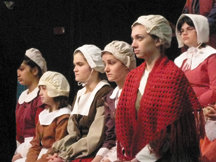When Arthur Miller wrote “The Crucible,” he meant it as a political allegory – one that reflected the anti-Communist witch hunts taking place in the 1950s. But unlike most allegorical literature, Miller’s political commentary seemed to touch on something more universal, giving it meaning that many of the students, teachers, and alumni acting in its production at Bayonne High School this week say reflects today’s world as well as the 1950s when Miller wrote it.
After several significant stage successes, including “A Christmas Carol” in 2008 and “Beauty and the Beast” in 2009, Director Tim Craig brings to the stage a much more complex play that requires actors to draw on real life experiences for their performance.
“It is our job as educators to seek truth. But how do you know what the truth is?” – Tim Craig
________
Although touted as a play about mass hysteria during the time of the Salem witch hunts, “The Crucible” was written in response to U.S. Senate hearings that forced people to testify against family and friends or face ruin or even jail. Miller himself was held in contempt when he refused to turn in others in order to save himself.
Using the backdrop of Salem in the 17th Century, Miller sought to disparage the savage attacks made on individual rights in the name of democracy.
Yet, as several of the actors in the Bayonne production noted, the play went far beyond its original scope, exploring themes of personal loyalty, honesty, family relations and adultery.
Written in the early 1950s, “The Crucible” takes place in Salem, Mass., in 1692, where gullible local residents are manipulated by personal agendas into prosecuting and executing supposed witches.
Witchcraft is blamed as the cause for illness among several residents, and the parents of one sick girl insist that the local reverend root out witches within the community. And they are suspicious of anyone who does not attend church regularly.
A ruse
Several girls, led by Abigail Williams, their wicked leader and a local slave, are seen performing rituals in the wilderness.
Abigail, who was involved with John Proctor, the play’s hero, schemed against Proctor’s wife after she broke up the affair. She accused a slave of being in league with the devil, and convinces other girls to claim they have seen the devil. As a result, a number of women – including Proctor’s wife – are accused of witchcraft. Proctor vows to free his wife, and sets out to prove the girls’ visions of Satan are pretense.
For Salha Qureshi, a senior at Bayonne High School who plays Abigail, the play is about one person controlling other people.
She said she has seen a video of the play and read the play numerous times in preparing for a part that must somehow convey why a woman in love would condemn someone else.
Summer Qureshi, a biology teacher at Bayonne High School, plays Elizabeth, whose role must deal with the complex feelings of a cheating spouse and being wrongly accused.
“I drew on real life,” she said.
Both women said the play is very contemporary, reflecting real emotions that people have to deal with in their everyday lives.
For Summer, this means trying to be loyal to the hero Proctor, even though he has cheated on her.
Both women say the play also reflects some of the corruption that they see in the world today.
Brendan Wahlers, a substitute English teacher at BHS, plays Proctor, and said, “I do understand him. This is stuff out of my own life. This is a play about how people make mistakes and how they deal with it. It just took too long for him to see his own errors.”
In some ways, Salha said, all of the characters are lying, either to other people or to themselves.
“The whole town is in a meltdown over this,” said Mark Squitieri, an alumnus who returns to work with Director Craig. “This is a perfect play for modern times.”
Joe Wyatt, a physics teacher at BHS, said his character, the judge, is caught up with a great dilemma.
“He’s executed several people and now he knows it was based on a lie,” he said. “All he wants is for the whole thing to go away.”
Wyatt said the play is a commentary of extremist religious beliefs in any faith.
“It is very much what we see going on today,” he said.
Craig called the play “essential,” and one that was something he believed he needed to put on to reflect the current political climate, both in the state and on a national level.
“It is our job as educators to seek truth,” he said. “But how do you know what the truth is?”
This week
The play will be presented at the Alexander X. O’Connor auditorium at Bayonne High School on Feb. 5 and 6 at 7 p.m. and on Feb. 7 at 2 p.m. Tickets cost $12 for adults and $9 for students or senior citizens.
You can purchase tickets in advance by calling the Bayonne High School Drama Office at (201) 858-0071 or at the door.
